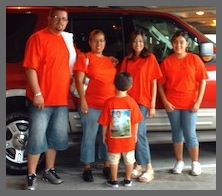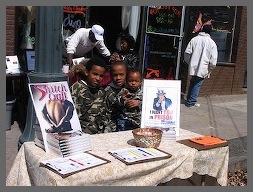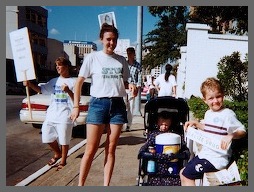Forming a November Coalition Family Group
Some people have trouble dividing time between family life and volunteering. Becoming a volunteer along with some or all of your family members can solve that problem. Volunteering as a family group can be done by an extended family, by a husband and wife, a parent and a child, or as a team of siblings.

Gonzales family: Kansas City, MO 2006
What do you gain by volunteering together as a family? First, you help assure progress toward that elusive, but much-pursued goal of "quality time" with each other while working for justice. Your evening conversations will be fresh and lively, a time of sharing ideas and planning for upcoming events.
It gives parents and caregivers an opportunity to teach children skills that active citizens should develop. You’ll be teaching a valuable lesson about involvement in government.
Perhaps you'll decide to call a family meeting and take time to explain your idea of a November Coalition Family Group, encouraging others present to give input. Be sure to have a current list of Coalition projects for review. Discuss together what projects you think would interest your family, projects for which individuals have time, resources and ability.
Some families have gone to Washington DC to meet with their legislators. Especially for east coast families, it’s a good city to convene for a family reunion with a special purpose. If you don’t live near DC, or have funds to plan a trip with your children, or grandchildren your members of Congress have local and state offices. To find out how to make an appointment locally, or in Washington, visit Vote-Smart for address information.
A family group can have a family impact on your leaders, and your children will learn to have personal contact with their elected officials. If a child has a loved one in prison, they can know they did important work while they learn how to do it. It’s a good method for adults, too. November’s Eye on Congress section has links to teaching any age group about the process of federal law, and ways everyone can be involved in replacing the drug war with science and an affordable reality.

Edrea Davis & Family, Atlanta, GA 2007
Once you have committed to a volunteer project, concentrate on it and take it seriously. Parents can demonstrate to children that volunteer work is important and meaningful. Talk about the activity during the week and plan ahead. Your children or other family members will learn to value and appreciate follow-through and commitment. You, too, may be challenged by what you experience as a volunteer. Share those feelings with your children.
If you're raising several children, the time may come when you choose to focus on an individual son or daughter. Sharing a volunteer project as a twosome may be the key to helping each child feel special.

November and DPFT Texas, Austin, 2000
If your loved one is imprisoned, and you're raising children, the work accomplished and time spent volunteering can prove all the more valuable. Children really do become interested in more than just recreation and play. They can gain an increased sense of purpose when working on a public issue that's so important to your family. Remember to be patient and acknowledge youthful imput. You may be surprised at how big an impact that involvement can have on a child's daily attitude. Activism can be empowering for kids, too! It offers a chance in a real way to do something positive for the imprisoned loved one, simultaneously helping to fulfill special, personal needs.
If you are going to have a meeting with many of your extended family members, be sure to review the chapter, Your First Meeting. While family meetings are usually informal, these instructions will help get the most from them.
Some people have trouble dividing time between family life and volunteering. Becoming a volunteer along with some or all of your family members can solve that problem. Volunteering as a family group can be done by an extended family, by a husband and wife, a parent and a child, or as a team of siblings.

Gonzales family: Kansas City, MO 2006
It gives parents and caregivers an opportunity to teach children skills that active citizens should develop. You’ll be teaching a valuable lesson about involvement in government.
Perhaps you'll decide to call a family meeting and take time to explain your idea of a November Coalition Family Group, encouraging others present to give input. Be sure to have a current list of Coalition projects for review. Discuss together what projects you think would interest your family, projects for which individuals have time, resources and ability.
Some families have gone to Washington DC to meet with their legislators. Especially for east coast families, it’s a good city to convene for a family reunion with a special purpose. If you don’t live near DC, or have funds to plan a trip with your children, or grandchildren your members of Congress have local and state offices. To find out how to make an appointment locally, or in Washington, visit Vote-Smart for address information.
A family group can have a family impact on your leaders, and your children will learn to have personal contact with their elected officials. If a child has a loved one in prison, they can know they did important work while they learn how to do it. It’s a good method for adults, too. November’s Eye on Congress section has links to teaching any age group about the process of federal law, and ways everyone can be involved in replacing the drug war with science and an affordable reality.

Edrea Davis & Family, Atlanta, GA 2007
If you're raising several children, the time may come when you choose to focus on an individual son or daughter. Sharing a volunteer project as a twosome may be the key to helping each child feel special.

November and DPFT Texas, Austin, 2000
If you are going to have a meeting with many of your extended family members, be sure to review the chapter, Your First Meeting. While family meetings are usually informal, these instructions will help get the most from them.